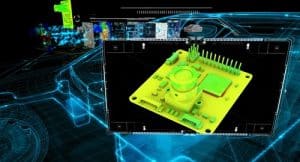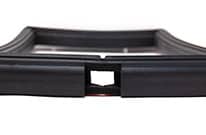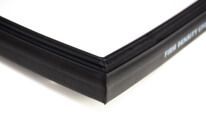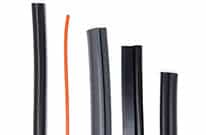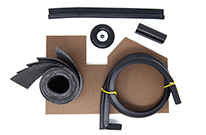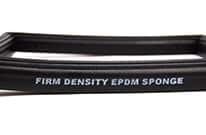Do you need EV engineering assistance? If you’re an electric vehicle (EV) manufacturer, sealing and insulation probably isn’t a priority – until it delays production or, even worse, stalls a product launch. So, while you’re busy thinking about a better battery or a more dynamic EV design, pick an experienced manufacturing partner instead of a rubber parts provider. Elasto Proxy adds value to EV industry projects and working with us is like having an extension of your engineering team.
Here are some examples of what we mean.
EV Engineering Assistance: Seal Design
Elasto Proxy met with an EV manufacturer that was using an extrusion from another supplier. Work had been done according to the EV manufacturer’s specifications, but there was still cause for concern. The extrusion’s durometer was too low, our team explained. The profile’s softness made it flexible, but the rubber’s higher oil content could cause leaching. Grease stains weren’t the only issue. Oils can cause adhesive failure, and a gasket that detaches may require recalls and undermine perceptions of EV quality.
The other supplier hadn’t raised these concerns, the EV manufacturer explained. Instead, they’d fabricated the gaskets according to spec but without asking questions that could reveal potential problems. Then the EV manufacturer asked if we could do some prototyping and testing to see if an Elasto Proxy gasket could radius window corners properly. Because we use waterjet cutting, a tool-less process, we’re ready to fast-track projects like this – and we can mold gasket corners if that’s what you need.
Molded corners are more expensive, so our team also told the EV company about how we can bond or glue cut lengths, too. It’s nice to have options, and it’s important to know what they are – especially when you’re in a race to get an electric vehicle to market and may not have time to figure out which questions to ask. By partnering with Elasto Proxy, however, you can get the type of engineering assistance you won’t find just anywhere else.
EV Engineering Assistance: Material Selection
Door gaskets for cars are usually made of EPDM, a synthetic elastomer that resists sunlight, weather, and outdoor environments. EPDM is cost-effective, but this synthetic rubber isn’t recyclable. It also weighs about 20% more than TPV, a thermoplastic elastomer that is more expensive but can be recycled. TPV gaskets are becoming increasingly popular in Europe, but that doesn’t mean they’re the right choice for your electric vehicle project. In short, you need to consider the pros and cons – and with some help.
Because of the weight of its battery, an electric vehicle weighs more than an ICE vehicle. TPV gaskets can support vehicle light weighting efforts, but the savings in pounds or kilograms isn’t that significant relative to the weight of the entire electric vehicle. Yet, TPV has an important advantage besides its recyclability. Unlike EPDM extrusions, which may have belt lines or track marks after curing, TPV extrusions have a smooth, clean finish that enhances your product design.
When you work with Elasto Proxy, we can help you to choose the right sealing and insulation material and then source it for you in lower minimum order quantities (MOQs) than other extruders. In the automotive industry, most extruders are geared-up to run very high volumes over multiple years. So, what happens if you need just 10,000 ft., or maybe just a 200 ft. sample? You can talk to Elasto Proxy, and we can also support increased volumes as you grow your business and need to buy more rubber.
Get Expert Advice and Assistance
Elasto Proxy works with EV manufacturers and provides value-added service along with expert fabrication. If you’re looking for a manufacturing partner rather than just a parts provider, we invite you to contact us and talk to our solutions providers. They’ll be happy to share what they’re seeing in the EV industry and look forward to learning more about your application.

